Yesterday Deadline Hollywood Daily‘s Nikki Finke posted an admittedly “incomplete” list of Hollywood political contributors to the campaigns of Hilary Clinton, Barack Obama, Bill Richardson, Rudy Giuliani, etc. Finke’s source is CNN Political Research Director Robert Yoon. It’s okay for a fast amusement scan, but I like the Newsmeat figures better. They have Adam Sandler down as a Giuliani contributor (along with David Zucker, Brad Grey, Kelsey Gramer and Ben Stein) but not Yoon. Yoon has Tom Hanks down as a HIlary suppporter and so does Newsmeat (he gave her $2100 in ’06) but the latter also lists Hanks as a $2500 Obama contributor as of last March. A lot of industry conributors cover their bases by giving to more than one candidate.
Chicago critics vs. 20th Century Fox
The Chicago Film Critics Association has reportedly (per Radar‘s Adam K. Raymond) instituted a coverage boycott against Fox releases (i.e., no features, profiles, and interviews — just film reviews) over unequal access to screenings and/or “being shut out of screenings entirely” by local Fox publicists.
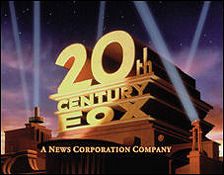
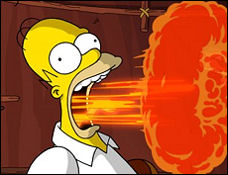
Except I asked about this last week, and was told by a 20th Century Fox spokesperson on Friday, 7.13, that Fox publicist Chris Petrikin had connected with CFCA spokeserson Dan Gire and “they had a good chat,” “we see their side and they see ours,” and “they are not going to continue this crusade against us.”
The nub of the matter is that Fox publicists are irate and freaking over review- embargo breaking by online critics and columnists, and that honcho Breena Camden has decided to get tough all over. This way no one in upper management can say she’s not taking strong action, but these restrictive measures are very sweeping and bludgeon-y.
Another indication of Fox’s extremely guarded screening policy is their decision to screen The Simpsons Movie for onliners on Thursday, 7.26 — the night before the nationwide opening. No other studio has done this to myknowledge — they either don’t screen dicey films or they screen them two or three days before opening. Fox also stipulatd that no plus-ones will be allowed to attend the 7.26 screening.
Fox’s message is basically “we don’t trust you and we really don’t trust your friends.” Obviously they don’t want early reviews because it’s the Wild West out there, etc., but the Simpsons brand skews older and smarter and could presumably benefit from early-ish reviews from the right people.
I suggested to Fox publicity that they should decide who among the onliners has behaved fairly and honorably (I have never burned them on a review embargo) and isolate these people and give them the courtesy of earlier screenings. My understanding is that this approach is being looked at with a degree of receptivity.
Franklin, Barnett are leaving?
I was told this morning that Dimension’s senior production vp Steve Barnett and director of development and production Alex Franklin are thinking about following production president Richard Saperstein out the door.
If the Barnett-Franklin story is true, this would leave Dimension honcho Bob Weinstein with no L.A. production execs, no creative presence…headless for the time being. No comment so far from Weinstein/ Dimension publicity staffers in Manhattan, so I called Franklin’s L.A. office. Franklin picked up and said that (a) he and Barnett are involved “in an ongoing situation that we’re all trying to resolve,” (b) that things are “up in the air” and (c) that he hopes to have his situation “resolved later this week.”
A non-Dimension production exec said this morning that Franklin is “walking for sure. They have an option on him but he told them in no uncertain terms he isn’t interested in staying. All I keep hearing are rumors that they [i.e., the Weinstein brothers] are running severely low on money.”
Saperstein’s departure was heatedly denied last week by Weinstein Co. spokes- persons, but “rumors continued to race around the industry that Saperstein had indeed been fired but that TWC was trying to figure out a way to avoid paying out a lengthy contract,” according to Variety columnist Michael Fleming.)
A Weinstein Co. spokesperson would only say that Barnett and Franklin “are employees at The Weinstein Company.”
Welcome Back, Potter
I don’t have a comprehensive tally of all the Welcome Back, Potter spoofs have appeared over the years. I know there was one that ran on SNL in ’02. This one is British-produced (Dawn Patrol Prods., apparently) and droll and, for me, freshly funny.
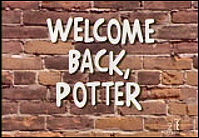
“Deathly Hallows” spoiled
Wow…the finale of J.K. Rowling’s Harry Potter and the Deathly Hallows book has already been spoiled. Apparently. I’m not at all sure but that’s how it appears. I mean, this zendurl.com saboteur has posted precise and exacting summaries plus photos of the final chapter pages — an epilogue that lasts nine pages and takes place “Nineteen Years Later.” Thanks to HE reader Peyton Westlake. I won’t reveal anything but if you’re so inclined…
The Catholic Church
A three-week-old interview report by Louis CK about the Catholic Church. Before jumping to any conclusions, understand that Louis was raised Catholic. Bitter, angry, funny…and the ending is perfect.
“Chuck and Larry” review
“Relentlessly juvenile and awash in stereotypes, I Now Pronounce You Chuck and Larry is the kind of buddy comedy Jack Lemmon and Walter Matthau might have starred in 40 years ago, when the material would have felt less dated, if no less silly. Kevin James and Adam Sandler hardly approach that standard, and it will be slightly depressing if a barrage of schoolyard gay jokes passes for ‘edgy’ a quarter-century after Victor/Victoria.” — from Brian Lowry‘s 7.13 Variety review.
“Potter” countdown
Four days, three hours and 45 minutes before the spoiling of the finale of Harry Potter and the Deathly Hallows. The first spoiling will come from the East Coast, of course. Figure sometime around 9:30 pm Pacific time. Okay, 10 pm. Make it 10:30 with all the steps involved — buy the book, run outside, read last five pages, hook up laptop in wi-fi-area, write spoiler with details, post spoiler.
“No End in Sight” trailer
Here’s a pint-sized trailer for Charles Ferguson‘s No End in Sight (Magnolia, 7.27.07 in NYC — 8.3 or 8.10 in Los Angeles). Like I wrote a week or so ago, Ferguson’s analysis of the Bush administration’s appalling handling of the ground situation in Iraq starting in May 2003 is truly arousing and sickening….in a good way. I had a marginal, not very detailed grasp of the situation in Iraq before seeing Ferguson’s film. After seeing it I felt as if someone had leaned over and turned the lens and sharpened the focus.
Repeating again, and I really mean this: No End in Sight is a serious contender for Best Feature Documentary. I know full well that 97% of the moviegoers out there will do the typical vegetable thing — i.e, will never see it, never rent the DVD, never think about it. It would be nice if some would think about responding differently.
David and Wendy
Today’s press conference by Republican Sen. David Vitter and his wife Wendy, which I watched on MSNBC, was an attempt by the Louisiana-based legislator to put the D.C. Madam hooker scandal behind him. The press should probably stop camping out on his front lawn, but any guy who allies himself with Bush administration attempts to push “family values” by voting against stem-cell research and making things tough for gays, and is then caught in a moral issue of his own deserves every last thing he gets.
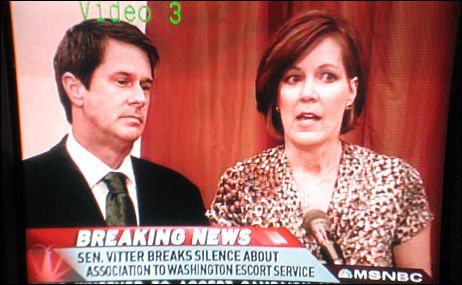
Sen David Vitter and wife Wendy
I love it when righties suffer in this manner, but I felt sympathy for Vitter when I realized why he’s prone to playing around. His wife is physically bigger than he is, especially in terms of head sizes, and she’s got a very fearsome stare.
According to Politico, “Vitter was included in a Newhouse News Service story [in 2000] about the strain of congressional careers on families. His wife Wendy was asked by the Newhouse reporter: If her husband were as unfaithful as Livingston or former President Bill Clinton, would she be as forgiving as Hillary Rodham Clinton?
“I’m a lot more like Lorena Bobbitt than Hillary,” Wendy answered. “If he does something like that, I’m walking away with one thing, and it’s not alimony, trust me.” She added,”I think fear is a very good motivating factor in a marriage. Don’t put fear down.”
So that explains it. Wendy’s got anger and violence in her, she’s tough, she’s physically threatening, her head is bigger than David’s and she could probably whup his ass. Obviously he cats around so he can feel like more of a man-with- the-power, so he can hang with eyelash-batting women who are less challenging.
Dump Season vs. Oscar season
Late July is traditionally regarded as the beginning of Dump Season. I don’t know if that applies to the next six weeks the way it has in years past. There are many films coming out between now and Labor Day that I’ve seen and know are good, or that at least have me going — Goya’s Ghosts, The Devil Came on Horseback, Moliere, No End in Sight, This Is England, Blame it on Fidel, The Bourne Ultimatum (obviously), Charlie Bartlett, 2 Days in Paris, The 11th Hour, Superbad (obviously), Resurrecting the Champ, Right at Your Door, etc.
But for the least two or three weeks most of the excitement on the screening circuit has been about the fall films, which is to say Toronto Film Festival films, which it say the first wave of Oscar maybes. Into The Wild, In The Valley of Elah, The Brave One, No Country For Old Men, In The Shadow of the Moon, Michael Clayton, The Golden Age, Lake of Fire, Things We Lost in the Fire, Gone Baby Gone (which publicists don’t want to show me just yet), Reservation Road, Margot at the Wedding, etc.
In effect, the ’07 Oscar season is here and happening right now. The four-and-a-half to five-month vacation period (from early March to late July) is over, and it’s time to get back on the hog.
“Jesse James” is seen
The Assassination of Jesse James by the Coward Robert Ford (Warner Bros., 9.21) was shown last week to a group of elite Fifth Estate cool cats. Digitally projected, sans credits…despite the 9.21 release date only two months away. We all know by now that poor, embattled, unloved Jesse James needs all the help it can get from sympathetic journos — i.e., those with a vulnerable soft spot for a long, painterly, Terry Malick-styled western shot by Roger Deakins, no matter how it plays otherwise.
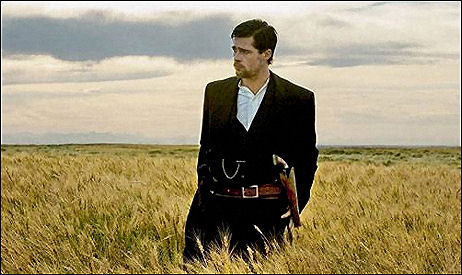
Lord knows there’s very little sense that WB distribution execs have been burning the midnight oil to promote the film. They can’t even be bothered to send out any new photos (i.e., the same four or five shots have been kicking around since last fall). The Jesse James website hasn’t changed either.
It’s funny, but I’ve heard so much about Andrew Dominik‘s much-delayed, kicked- around film that I almost feel I’ve seen the darn thing. Lots of dialogue, beautiful- ass photography, “not really a western,” much more Casey’s movie than Brad’s, etc. The version shown last week ran about two hours and 40 minutes, I’m told. In one conversation the word “attenuated” was used. The same guy said “it could be tightened” by “15 minutes,” and that the story “tends to play out without things that really add to it.”
Brad Pitt‘s performance as Jesse James is one of his better turns, a viewer feels. Unlike the various James portrayals of yore, Pitt’s version is “sort of a psycho.” Sam Shepard plays Frank James, and the viewer I spoke said there’s no problem believing that Shepard could be Pitt’s brother despite the former being 20 years older than the latter. The film belongs more to Casey Affleck‘s Robert Ford, “a bumpkin who wants to be part of the gang.”
The film doesn’t end with James’ shooting, but deals interestingly with the aftermath. “It’s sort of about celebrity,” the viewer says. “By killing Jesse Ford figured he’d become a celebrity. [To this end] he reenacts the murder in a show around the country, but he becomes a pariah.”

